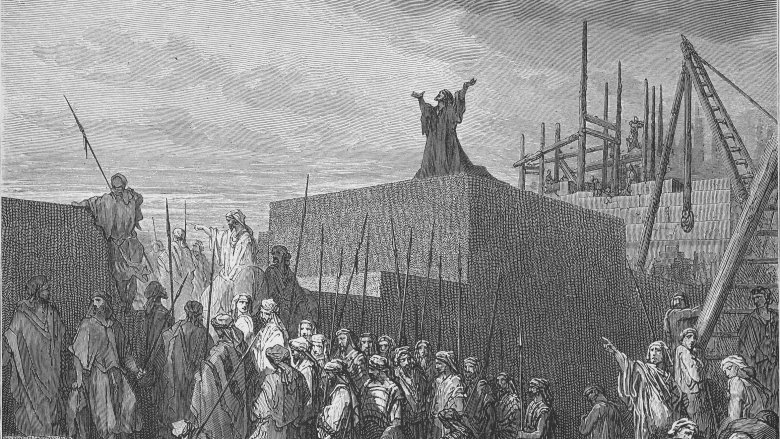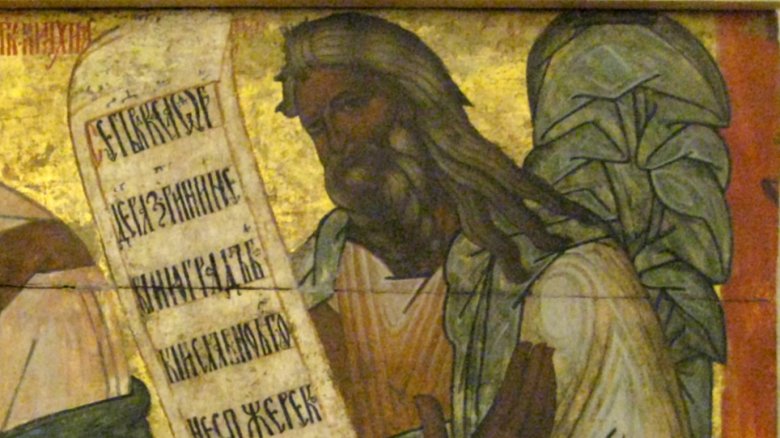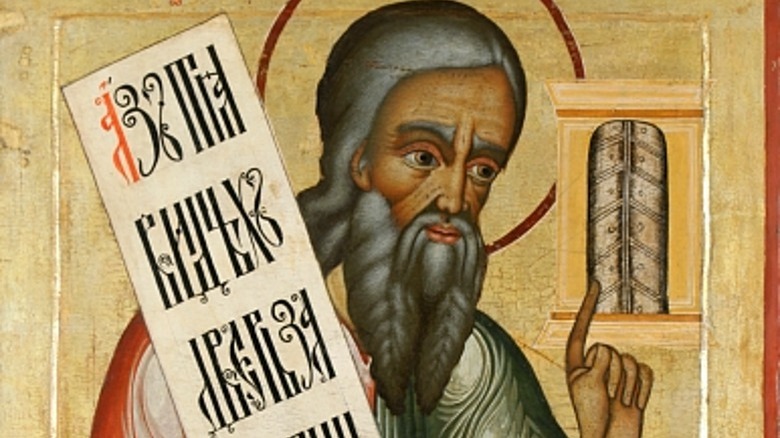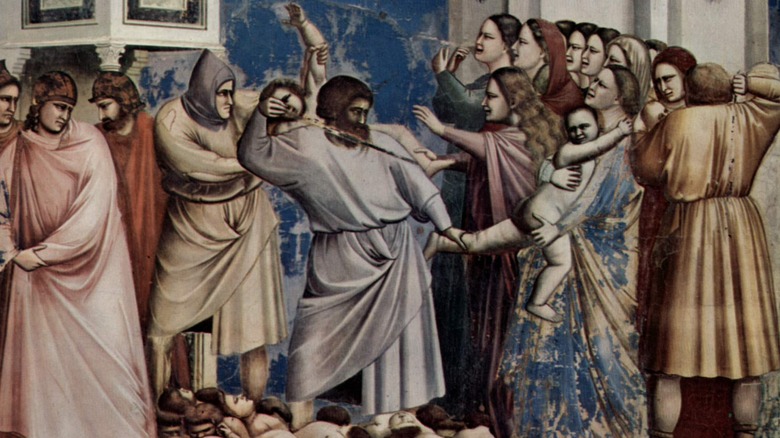Bible Prophecies That Eventually Came True
Whether you're a believer of any stripe or not, the Bible is a foundational text for Western civilization, with its moral teachings at the heart of many of our laws, and its more literary elements providing fodder for allusions in everything from Shakespeare to Iron Maiden songs. One of the more intriguing elements of the Bible is the idea of prophets — guys with names like Habakkuk or Zephaniah, whose job was to speak for God and tell the future. If the Bible is full of predictions of the future, surely we can glean something useful from it, or at least use the confirmation of its predictions as signs of the accuracy of its claims.
However, as fun as it is to imagine that there are verses hidden in some obscure book of prophecy that foretells the rise of airplanes and social media, those kind of distant, far-reaching predictions don't really exist in the biblical canon. Most prophets were generally concerned with the rise and fall of the world powers of their times — Assyria, Babylon, Greece, Rome — and how the interactions of these nations with the Israelites could be viewed as God's pleasure or displeasure with his chosen people. But depending on whether you take a more traditional or historical view of the compositions of biblical prophecy, God's spokespeople had a pretty good track record of foreseeing the decline and fall of various empires.
Here, then, are some examples of times when God's messengers seem to have gotten it right and Bible prophecies eventually came true, including a couple of more modern predictions that have to be found by reading between the lines, so to speak.
Isaiah predicts Assyria's failed siege of Jerusalem
Both Jews and Christians alike consider Isaiah to be the greatest of the Hebrew prophets, and both groups especially treasure the messages contained in his eponymous book. The historical Isaiah lived in the eighth century B.C., and served as an adviser to multiple kings of Judah during the time when the major world power was the Assyrian Empire, which had earlier conquered Israel, Judah's sister kingdom to the north. Much of the prophecy in the early chapters of the Book of Isaiah regards the threat of Assyria, with many of Judah's kings disregarding Isaiah's (and by extension, God's) advice. It isn't until the reign of Hezekiah, considered the first righteous king in a while, that someone in charge actually listens to what Isaiah has to say.
So what did Isaiah have to say? Well, around 701 B.C., the Assyrian king Sennacherib laid siege to Judah and captured its cities. A panicked Hezekiah asked Isaiah for advice, and the prophet very helpfully told him to do nothing, because the siege would fail. And this turned out to be right. For unknown reasons (though many scholars believe disease was involved), hundreds of thousands of Assyrian soldiers died, and Sennacherib returned home.
Even more interestingly, the latter chapters of Isaiah correctly predict the rise of the Babylonian Empire and Judah's fall to it, nearly a century in advance. So either Isaiah earned his reputation as the greatest prophet, or, as many scholars argue, significant portions of his predictions were actually written after the fact.
Jeremiah's prophecy about the fall of Jerusalem
By word count, the longest book in the Bible is the Book of Jeremiah, which collects the sayings of the so-called "Weeping Prophet." According to tradition, Jeremiah wrote not only the book of prophecy that bears his name, but also the mournful poems of Lamentations and the historical Book of Kings. Jeremiah's ministry began roughly 50 years after the end of Isaiah's, and so pretty much the entirety of the longest book in the Bible deals with the threat posed by Assyria's successor on the world stage, Babylon. The very first chapter of Jeremiah describes Babylon as "a boiling pot, tilting away from the north," and before long, Jeremiah is doing strange underwear-based performance art to warn the people of Judah that Babylon is coming as God's righteous punishment upon his unfaithful people.
And that foretold righteous punishment hit hard. The Babylonian king Nebuchadnezzar laid siege to the capital city of Jerusalem in 597 B.C., pillaged the great Temple of Solomon, and took the king and many prominent citizens back to Babylon as exiles. Jeremiah warned the puppet regent that he should surrender to Babylon, but he revolted, and as punishment, the Temple and the whole city of Jerusalem were destroyed in 587 B.C.
As with Isaiah, however, it's important to note that many scholars argue that only portions of the Book of Jeremiah (about the first half) are authentically by the prophet, and many portions were written later by Jeremiah's scribe Baruch ... and some even after the Babylonian exile by later generations of followers of Jeremiah.
Ezekiel predicts the fall of Tyre and Egypt
The third of the major prophets is Ezekiel, whose self-titled book of prophecy contains a series of six visions so trippy that some people claim them as evidence that UFOs have been visiting the Earth since ancient times. Ezekiel lived during the time of the Babylonian exile that Jeremiah warned against, and portions of his prophecies promise the end of the captivity and the restoration of Jerusalem and its temple. The middle chapters of his prophecies, however, contain warnings of destruction against foreign nations. (This isn't an uncommon theme in biblical prophecy. Isaiah and Jeremiah spent quite a while on this topic as well, basically going page by page through an atlas and cursing everyone they saw).
Most notably, Ezekiel's predictions against Egypt and the great city of Tyre show proof of the prophet's accuracy. Ezekiel promises that Tyre will be swept away by enemies, and Egypt will be a desolate waste. As it so happened, Nebuchadnezzar's 13-year war against Tyre drove the Tyrian people off the mainland and onto an island, and the Muslim invasion of Egypt in the seventh century A.D. left Egypt relatively insignificant.
Skeptics argue, of course, that these interpretations are a stretch, as neither Tyre nor Egypt were left the smoldering ruins promised by Ezekiel. In fact, Tyre made peace with Babylon, and the specific claims that Egypt would lie empty for 40 years never happened. But prophetic interpretation can be, uh, a dicey proposition.
Prophets predict the restoration of Israel
The Assyrian conquest of the Northern Kingdom of Israel in 722 B.C. saw many Israelites banished from their homes and scattered about the Middle East. This scattering of the Jewish people worsened in the age of the Babylonian exile in the sixth century B.C., and reached its final tipping point with the Roman conquest of Jerusalem in A.D. 70. This saw the Second Temple destroyed, the Judean state crushed, and the Jewish people driven from their homes, all of which contributed to a dispersion of Jewish people around the world known as the Diaspora. As a result, it probably won't surprise you that a lot of Hebrew prophecy, including apocryphal Jewish apocalyptic literature, concerns the idea of the restoration of Israel and the Jewish people.
The latter chapters of Ezekiel promise that Jerusalem and its temple will be rebuilt and the people who'd been scattered will be brought back home. The middle chapters of Jeremiah promise restoration for Israel and Judah. While some would argue that these prophecies were predicting the post-Exilic Second Temple period of Judah, some argue that this references the modern state of Israel, which portends the approaching end times. For Jews, that would include the Messianic Age, and for Christians, that would include the Second Coming of Christ.
Whatever you believe (or don't) about Jewish or Christian eschatology, it's certainly true that some prophets said Israel would exist again, and it currently does.
Daniel's prophecies about a succession of empires
The biblical figure of Daniel, whom people with only a passing knowledge of the Bible will know as the guy from the lion's den, was among the noble citizens of Judah who were taken to Babylon during the exile. His clean living (together with that of his pals Shadrach, Meshach, and Abednego, whom you might remember surviving the fiery furnace) and uncanny ability to interpret dreams guaranteed him a position of power in the court of Nebuchadnezzar ... where he prophesied doom for Babylon.
Probably the two most famous predictions of Daniel come from his interpretation of Nebuchadnezzar's dream of a statue made of various materials, and from the vision of a ghostly hand writing on a wall at King Belshazzar's feast. According to some modern interpretations,, both of these prophecies predicted that Babylon would fall to the Persians, which would subsequently fall to the Greeks, themselves superseded by the Romans, all of whom would eventually yield to the might of the Kingdom of God. As this was indeed the succession of power in that part of the world (minus, arguably, the arrival of the Kingdom of God), many people take the fulfillment of Daniel's prophecy as proof of the accuracy of the Bible.
The rebuttal to this, of course, is that most scholars agree that the Book of Daniel was actually written centuries after the Babylonian exile, and Daniel's foresights were actually hindsights.
Nahum foretells drunk Assyrian soldiers
While prophets like Isaiah, Jeremiah, and Ezekiel hold the lofty title of "major prophets" thanks to their weighty tomes of intoned doom against the world's greatest empires, the Hebrew Bible is also full of minor prophets whose messages from God are mercifully much shorter and more concise than their major colleagues. One such minor prophet was Nahum, a contemporary of Isaiah who spent most of his three-chapter book proclaiming the downfall of Assyria, specifically its capital city, Nineveh. You might remember Nineveh as the city the prophet Jonah hated so much that he'd rather be eaten by a big fish than warn them of God's wrath, or you might recognize it as the historical capital of the real Neo-Assyrian Empire. Either is fine.
An interesting thing about Nahum's prophesies against Nineveh is how specific they are. Chapter one says that the Ninevites will be drunk like drunkards and consumed like dry straw. The ancient Greek historian Diodorus Siculus recorded that the city of Nineveh was attacked by people who took advantage of the fact that the Assyrian king had given his soldiers too much wine, and that they were too drunk to defend the city. Likewise, archaeologists found a layer of ash in the ruins of Nineveh, suggesting it was burned as Nahum foresaw.
Of course, the killjoy response to this is that condemning your enemies as drunkards is a pretty common way to impugn their morals, and saying that a city will burn is probably the most generic possible threat, so make of it what you will.
Various prophets predict the birth of Jesus (maybe)
From a Christian perspective, basically everything in the Old Testament, from Genesis to Malachi, is leading toward the birth of Jesus, whom Christians identify as both the Son of God and the long-promised Messiah.
As such, it's very easy to find examples of Christian interpretation of Hebrew prophecies. For example, Daniel chapter 9 says that the Messiah will come after the restoration of the Temple and before it's destroyed for a second time, and the historical Jesus did live during the Second Temple period. Genesis 49 claims that the tribe of Judah would retain power until the coming of the Messiah, and this is interpreted to mean the Herodian dynasty that was usurped by the Romans in Jesus' lifetime. Much tradition, including Isaiah chapter 1, claims that the Messiah will be a descendant of the royal line of David, and the genealogies (aka the "begats") in the Gospels of Matthew and Luke go to some effort to prove Jesus as descended from David through Solomon (even if those genealogies don't match).
The response from Jews and secular skeptics alike is that Jesus did not, in fact, fulfill messianic prophecy, and the Gospels actually stretch and decontextualize prophecies to make Jesus seem like he fits them.
The Bible predicts the rise of Muhammad
Although the name Muhammad doesn't appear anywhere in the Bible, it's been a part of Muslim tradition since the earliest days that both Hebrew and Christian scriptures predicted the rise of the great prophet of Islam. Deuteronomy 18:18, for example, proclaims that God will raise up a prophet from among the people, which Muslim scholars have long interpreted as meaning from among the people of Ishmael, the son of Abraham, who's considered the ancestor of the Arab people.
Likewise, Deuteronomy 33:2 describes God shining forth from three places: Sinai, Seir, and Mount Paran. The Muslim understanding is that Sinai refers to the advent of Moses, Seir to the rise of Jesus, and Paran — which is understood to be Mecca — to the coming of Muhammad. Similarly, the "Paraclete" — or "Advocate" — promised in John chapter 14, understood by Christians to be the Holy Spirit that descended on the Apostles after Jesus' ascension, is interpreted by Muslims to mean a "Comforter" sent by God, namely Muhammad. It was believed that this Comforter would clear up the misconceptions brought on by the incomplete teachings of the Hebrew and Christian scriptures, which was, of course, to be accomplished through the Quran.
The flip side of this is that some medieval and early modern Christians interpreted Muhammad as being prophesied by the Bible, too ... as one of the Antichrists promised in the Epistles of John.
Revelation predicts RFID chips and the EU
What would a list of biblical prophecies be without a discussion of the mysterious and much-vaunted Apocalypse of John, better known as the Book of Revelation? The terrifying visions of angels, dragons, beasts, and horsemen have captivated imaginations for centuries, and as some Christians interpret the book as a prophecy of the end times, many have sought evidence of the modern world in the apocalyptic visions of John of Patmos, including signs of modern technology that portend the arrival of the end times.
Perhaps the most widespread idea of Revelation reflecting the modern world is that the mark of the Beast — explained in chapter 13 as a mark on one's hand or forehead, without which you can't buy or sell anything — is some kind of barcode or radio-frequency identification (RFID) chip that will be used to enforce control over the people. Similarly, some Christians claim that the reference in chapter 11 to how people of all nations will be able to see the dead bodies of the slain witnesses of God almost instantly hints at live, globe-spanning communication and the 24-hour news cycle. And of course, a popular detail among conspiracy theorists is that the Beast is supposed to arise from a European power even bigger than the Roman Empire, widely interpreted as the European Union.
Of course, there's always a counterpoint, and here, it's that Revelation is a thinly-veiled criticism of the Roman Empire, which had recently destroyed Jerusalem.
The Bible Code predicts all sorts of crazy things
For some people, the explicit prophecies laid out by the prophets of the Hebrew and Christian scriptures aren't enough. There must be, they say, even more secret predictions contained within a series of hidden patterns in the original Bible text. Some kind of Bible code. They call it ... "the Bible code." In 1997, Michael Drosnin's book "The Bible Code" made a splash with its claim that manuscripts of the first five books of the Bible contain references to specific modern events.
The way this code works is by using what's known as "equidistant letter sequences." That is, looking at every second, fifth, tenth, hundredth (etc.) letter and seeing what it spells. That way, you can find hidden meaning in the Hebrew manuscripts. Using this method, Drosnin claimed that the Bible predicted John F. Kennedy's assassination in Dallas, the use of Scud missiles in the Gulf War, and the assassination of Israeli prime minister Yitzhak Rabin. Drosnin went on to explain that the Bible was actually written by aliens who brought human DNA to Earth and left the key to understanding the code hidden in a steel obelisk near the Dead Sea, just in case you were wondering how full a deck this guy was playing with.
Needless to say, the Bible code has been heavily debunked by scholars and church groups alike, who point out one major flaw in Drosnin's claims: the long history of textual revisions of biblical manuscripts. In other words, the Bible we have now isn't identical to the original versions.
Jeremiah predicts the Jewish diaspora returning to Israel
Numerous different prophets in the Hebrew Bible talk about the restoration of Israel, and given the tragic history of Jerusalem, there are a number of different conquests these prophets could be referring to. These prophecies are possibly referring to the Second Temple period, during which the Jerusalem Temple was rebuilt after the Babylonian conquest, but the longest period in which Jerusalem was in need of restoration was following the destruction of the Second Temple by the Romans in A.D. 70. On the other hand, some commentators believe that the restoration of Jerusalem promised by the major prophets instead refers to the creation of the modern nation state of Israel in 1948.
One piece of evidence used to make this argument is a detail from the Book of Jeremiah. In chapter 16, the prophet reports that God will regather his people from where they have been scattered — that is, the Jewish diaspora that sent the people of Israel and Judah all over the world — and God specifically says, "I am now sending for many fishermen, says the Lord, and they shall catch them, and afterward I will send for many hunters, and they shall hunt them from every mountain and every hill and out of the clefts of the rocks."
These fishers and hunters are taken to mean the enemies of the Jews — particularly Nazi Germany — whose persecution of the Jewish people led to the creation of a new state of Israel, which led many diaspora Jews to return to their ancestral land.
Zechariah foresees Jerusalem standing against more powerful nations
Since the Bible — both the Hebrew scriptures and the New Testament — was largely written by people living in or otherwise having some connection to the nation of Israel, it stands to reason that most of the prophecies contained within the Bible relate to the fate of Israel in some way. This includes apocalyptic visions that almost universally predict the destruction of God's enemies and a grand restoration of Israel to eternal glory. As a result, some more conservative Christian commentators — who believe they will be the ones to inherit the glorious new eternal kingdom — have looked with great interest at the war between Israel and Hamas that began in late 2023 as potentially fulfilling various end times prophecies.
In chapter 12 of Zechariah, one of the minor prophets, the Lord declares through his earthly representative that Jerusalem will achieve a major victory over its enemies, and the passage uses some colorful imagery to describe this. Namely, it says that God is "about to make Jerusalem a cup of reeling for all the surrounding peoples," and that he "will make Jerusalem a heavy stone for all the peoples; all who lift it shall grievously hurt themselves." Why does God need to protect Jerusalem to such a degree? Because "all the nations of the earth shall come together against it."
Conservative Christian commentators see this as a reference to the modern day, in which much larger nations such as Turkey, Russia, and Iran all seem to be targeting Israel, despite which Israel has survived, as if God has kept his promise to supernaturally protect Jerusalem.
Ezekiel warns of Iran's threat to Israel
On April 13, 2024, Iran launched an attack of over 300 missiles and drones at Israel in retaliation for an Israeli strike on the Iranian consulate in Damascus earlier that month. This was Iran's first ever direct attack on Israel in modern times, and the first attack on Israel by a foreign power in decades. For some Christians, this action is the fulfillment of God's promise that Iran would become a great threat to Israel, as well as being a sign that the end times are at hand.
The nation of Iran didn't exist in Biblical times, but the region that is Iran today is generally identified with the nation of Elam, which was eventually part of the Persian Empire. Ezekiel 38 describes an invasion of Israel by its enemies, led by a prince named Gog from Magog. One of Magog's allies in this invasion is Persia, aka Iran. Interestingly, many Christian commentators interpret Magog as a reference to Russia, which is at present a strong ally of Iran. Other nations in this coalition from Ezekiel include modern-day Turkey, Libya, and Sudan.
But while more conservative commentators see increased aggression from Iran toward Israel as a fulfillment of the prophecy that Iran would become a substantial threat to Israel, they also see it as a sign of things to come: namely the apocalyptic battle of Gog and Magog, in which God will directly intervene and Iran and its allies will be completely destroyed.
Hebrew scriptures might foretell hundreds of details from Jesus' life
The authors of the Gospels — particularly Matthew — were pretty heavily concerned with showing that Jesus fulfilled numerous prophecies from the Hebrew scriptures. This was largely to validate their claim that Jesus was indeed the promised Messiah. Besides the claims made about Jesus' birth — such as his being born in Bethlehem and being born of a virgin — some Christian groups believe that the life of Jesus represented over 300 fulfilled prophecies from the Hebrew Bible.
For example, Hosea 11:1 says, "out of Egypt I called my son," which some Christians understand to be referring to Mary, Joseph, and the infant Jesus returning from Egypt, after hiding there because Herod was trying to kill them. In Deuteronomy 18, Moses tells the Israelites that God will raise up a prophet from among them, which has been subsequently interpreted to mean Jesus. The fact that Jesus' legs were not broken as he hung on the cross is seen to be prefigured by the description of the Passover lamb in Numbers 9:12. Even smaller details, such as people mocking Jesus at his crucifixion and shaking their heads at him are said to be a fulfillment of Psalm 22:7, which says, "All who see me mock me."
However, it is as ever worth noting that the Gospel authors were motivated to convince people Jesus was the Messiah, so these details of Jesus' life may have been added in order to fit these particular verses — many of which are not even from prophetic religious writings.
Isaiah's suffering servant might hint at Jesus
One of the more extended passages from the Hebrew scriptures, believed by Christians to be a reference to the life and death of Jesus, is a figure from the Book of Isaiah known as the "Suffering Servant." Isaiah describes this figure beginning in chapter 52, but the bulk of the passage is in chapter 53. The Suffering Servant is described as someone who is oppressed and afflicted, but nevertheless acts wisely and will be exalted for it.
The Gospel authors point to many different parallels between this passage from Isaiah and the life of Jesus. When Jesus heals his disciple Peter's mother-in-law, Matthew points out that this fulfills the claim that the Servant "took our infirmities and bore our diseases." In the Gospel of Luke, Jesus tells the disciples that they need to arm themselves, because Isaiah says that the Servant will be "counted among the lawless." For modern Christians, the figure of the Servant as someone who bears the suffering of others through a violent death in order to take on the burden of their sins is revealed in the death of Jesus, which they believe reconciled humanity and God.
Alternative interpretations of the Suffering Servant prophecy abound among both the Jewish and scholarly communities, but perhaps the most common understanding is that the Servant represents the people of Israel itself, who had been, and would continue to be, oppressed by foreign powers such as the Assyrians, Babylonians, Greeks, and Romans. Other groups, however, interpret the passage as the promise of some non-Jesus Jewish Messiah.
Jeremiah lamented Herod's massacre
If the only part of the biblical Christmas story you know is the bit Linus recites in the Charlie Brown Christmas special, then you may not be familiar with the part where the client king of Roman Judea ordered a whole bunch of babies to be killed. This was done in the hope that one of them might be Jesus, who King Herod worried might try to replace him as King of the Jews. This episode is popularly known as the Massacre of the Innocents and can be found in Matthew chapter 2. The order was to kill every child in Bethlehem under two years of age, which — depending on the source — could have been as many as 144,000 or, more realistically, fewer than 20.
The author of Matthew explains that this slaughter of anywhere between 6 and over 100,000 babies is the fulfillment of a prophecy from Jeremiah 31: "Thus says the Lord: A voice is heard in Ramah, lamentation and bitter weeping. Rachel is weeping for her children; she refuses to be comforted for her children, because they are no more." "Rachel" here refers to the wife of the Israelite patriarch Jacob, and so represents the women of Judea (in Matthew's interpretation, Bethlehem) crying over their children lost in the massacre.
It is important to note, however, that most mainstream scholars do not believe such a massacre ever actually happened, and the larger context of the verse from Jeremiah makes it clear he is (on at least one level) talking about Israelite captivity in Babylon and Assyria.
Paul predicts a period of great apostasy
Trinitarian Christians such as Protestants, Catholics, and the Orthodox are not the only ones who look at prophecies from both the Old and New Testaments as having been fulfilled. The Church of Jesus Christ of Latter Day Saints, aka the Mormons, also believe that the promises of the Bible have come true. The Apostle Paul writes in 2 Thessalonians 2:3 that the Kingdom of God "will not come unless the rebellion comes first." Mormons understand this passage to refer to what they call the Great Apostasy, which was the period following the deaths of the original Apostles, in which the true Gospel and priesthood was lost and many churches were formed by well-meaning people who loved God but didn't have the complete truth (e.g., Catholics and Protestants).
In Acts 3:21, however, the Apostle Peter promised that there would come a "time of universal restoration that God announced long ago through his holy prophets." Latter-day Saints believe that this refers to a restoration of the true Gospel that occurred in 1820, when God called Joseph Smith to be his prophet to return God's lost message to humanity. His authority was amplified in 1829 when, according to the Church of Jesus Christ of Latter-day Saints, John the Baptist (and later some Apostles) appeared to him and anointed him as a priest of the true priesthood.
The next year, now having been given the authority of a priest, Smith founded the Mormon church, seemingly in fulfillment of Peter's declaration.
Ezekiel predicts the Book of Mormon
In the Book of Ezekiel chapter 37, God tells the prophet Ezekiel to take two sticks, and write on one of them, "For Judah and the Israelites associated with it," and on the other one, "For Joseph (the stick of Ephraim) and all the house of Israel associated with it." Then God tells Ezekiel to take the two sticks in one hand until they become one stick. The message seems to be that the divided kingdoms of Israel and Judah will be reunited, and the exiles from the Northern Kingdom driven out by Assyria will return.
For Mormons, however, this prophecy is not about a united nation state of Israel, but rather about the restoration of the word of God. In this interpretation, the stick of Judah doesn't represent the southern kingdom of Judah, nor does the stick of Joseph/Ephraim represent the northern kingdom of Israel, but rather the stick of Judah is the writings of the people of Judah (i.e., the Bible), and the stick of Joseph are the writings of Joseph (Smith; i.e., the Book of Mormon).
As a result, Latter-day Saints interpret this to mean that Ezekiel then was not prophesying a reunification and restoration of Israel and Judah, but rather a restoration of the true Gospel of Jesus Christ through the union of the Bible with the Book of Mormon. Joseph Smith is believed to have translated the latter from golden plates given to him by an angel, and which contain the history of Jesus' interactions with the indigenous peoples of America before the arrival of European colonizers.
The Wisdom of Solomon foretells Jesus' crucifixion
There's one ancient Jewish text containing what Christians believe is a prophecy fulfilled in Jesus that's particularly fascinating. The reason it's so interesting is that the book the passage comes from is one that many Christians would not consider truly biblical. The book in question is the Wisdom of Solomon, a Jewish text from the first century B.C. found in Catholic and Orthodox Bibles, but not Jewish or Protestant ones. Nevertheless, some Protestant Christians point to the Wisdom of Solomon as a proof text that the life of Jesus was a fulfillment of messianic prophecy.
Verses 12-20 of this chapter describe a "righteous man" who "calls himself a child of the Lord," and who the people of Israel will "condemn ... to a shameful death" because he "reproache[d them] for sins against the law," but because he is truly righteous and a child of God, God "will deliver him from the hand of his adversaries." If you approach scripture with a Christian perspective, it's probably pretty difficult not to see that as a description of Jesus, especially compared to, for example, the words of the chief priests mocking the crucified Jesus in the Gospel of Matthew: "He trusts in God; let God deliver him now, if he wants to, for he said, 'I am God's Son.'"
Again, however, scholars would argue that the texts match so well because the author of Matthew was familiar with the passage from Wisdom, and tailored his description to match.
Jesus and Paul predict apocalyptic conditions
The most famous New Testament book about — or at least, commonly interpreted to be about — the end of the world is almost certainly the Book of Revelation. However, there are other passages throughout the New Testament that talk about what conditions will be like leading up to and during God's final judgment on the world. One such passage is the so-called Olivet Discourse, which the Gospel of Matthew records as a discussion Jesus had with his disciples on the Mount of Olives about the end times. This extended discourse is one frequently cited by Christians who believe in a Rapture, because of warnings such as "Then two will be in the field; one will be taken, and one will be left."
Some more evangelical Christians argue that the circumstances of the modern day fulfill the warnings of the end times provided in the Gospels and the letters of Paul. Jesus' predictions in Matthew 24 of "wars and rumors of wars" as well as "famines and earthquakes in various places" are seen by some to reflect contemporary events. In his first letter to Timothy, the Apostle Paul warns that the period leading up to the end of the world would be a godless time, full of people who are "lovers of themselves, lovers of money, boasters, arrogant, abusive, disobedient to their parents, ungrateful, unholy," and so on. For modern evangelicals, these words describe our modern world to a T.
Are the last days at hand? Well, maybe. But then again, when has there ever not been war or kids who disobey their parents?




















